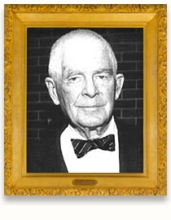Solicitor General: Archibald Cox

Born in 1912, Professor Cox graduated from Harvard Law School in 1937, joining the Boston law firm of Ropes, Gray, Best, Coolidge and Rugg. He began his government career during World War II when he was appointed to the National Defense Board, and then to the Office of the Solicitor General. When the war ended, he returned to Harvard Law School, this time as a professor. While there he became an adviser and speech writer for John F. Kennedy, then the junior senator from Massachusetts. Cox took a four year leave beginning in 1961 to join the Kennedy administration as solicitor general. Among the cases he was involved in were Baker vs. Carr, which set standards for reapportionment; Heart of Atlanta, which broke ground on public accommodations for all; South Carolina vs. Katzenbach, which upheld the Voting Rights Act; and Buckley vs. Valeo, which reformed campaign financing.
In May 1973, Attorney General Elliott Richardson, a former law student of his, appointed him to the job of special Watergate prosecutor. When the Senate investigation revealed the existence of audio tapes ordered by President Nixon, Special Prosecutor Cox subpoenaed them from his employer.
After two appeals of the subpoenas were turned down, the president offered to give the Senate and Cox written summaries of what was on the tapes. Cox turned down the deal. Nixon then ordered Richardson to fire him. But the attorney general refused, and so did Assistant Attorney General William Ruckelshaus. Nixon turned to then solicitor general, Robert Bork, who did carry out the order. The event became known as the "Saturday Night Massacre."
In his teaching career at Harvard and Boston University Law School, Cox established himself as one of the leading law educators of the 20th century. Besides the Paul Douglas Ethics in Government Award, Professor Cox was also the recipient of the Thomas "Tip" O'Neill Citizenship Award.

 U.S. Department
of Justice
U.S. Department
of Justice